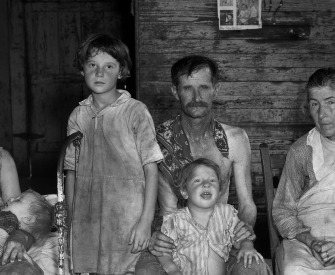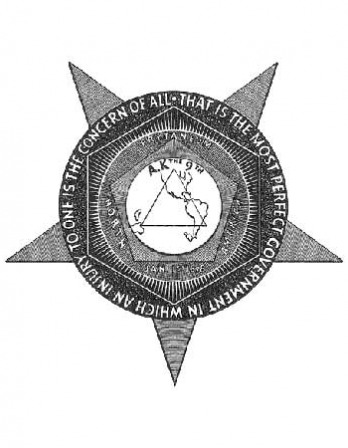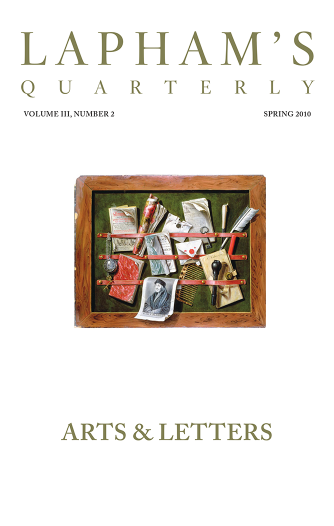The conquest of the earth, which mostly means the taking it away from those who have a different complexion or slightly flatter noses than ourselves, is not a pretty thing when you look into it too much.
—Joseph Conrad, 1899Of Men, for Men, by Men
Susan B. Anthony breaks the rules because the deck is stacked.
Judge Ward Hunt: The prisoner will stand up. Has the prisoner anything to say why sentence shall not be pronounced?
Susan B. Anthony: Yes, your honor, I have many things to say; for in your ordered verdict of guilty, you have trampled underfoot every vital principle of our government. My natural rights, my civil rights, my political rights, are all alike ignored. Robbed of the fundamental privilege of citizenship, I am degraded from the status of a citizen to that of a subject; and not only myself individually, but all of my sex are, by your honor’s verdict, doomed to political subjection under this so-called Republican government.
Judge Hunt: The court cannot listen to a rehearsal of arguments the prisoner’s counsel has already consumed three hours in presenting.
Anthony: May it please your honor, I am not arguing the question, but simply stating the reasons why sentence cannot, in justice, be pronounced against me. Your denial of my citizen’s right to vote is the denial of my right of consent as one of the governed, the denial of my right of representation as one of the taxed, the denial of my right to a trial by a jury of my peers as an offender against law, therefore, the denial of my sacred rights to life, liberty, property, and—
Judge Hunt: The court can not allow the prisoner to go on.
Anthony: But your honor will not deny me this one and only poor privilege of protest against this high-handed outrage upon my citizen’s rights. May it please the court to remember that since the day of my arrest last November, this is the first time that either myself or any person of my disfranchised class has been allowed a word of defense before judge or jury—
Judge Hunt: The prisoner must sit down; the court cannot allow it.
Anthony: All my prosecutors, from the Eighth Ward corner-grocery politician, who entered the complaint, to the United States marshal, commissioner, district attorney, district judge, your honor on the bench, not one is my peer, but each and all are my political sovereigns; and had your honor submitted my case to the jury, as was clearly your duty, even then I should have had just cause of protest, for not one of those men was my peer; but, native or foreign, white or black, rich or poor, educated or ignorant, awake or asleep, sober or drunk, each and every man of them was my political superior; hence, in no sense, my peer. Even, under such circumstances, a commoner of England, tried before a jury of lords, would have far less cause to complain than should I, a woman, tried before a jury of men. Even my counsel, the Hon. Henry R. Selden, who has argued my cause so ably, so earnestly, so unanswerably before your honor, is my political sovereign. Precisely as no disfranchised person is entitled to sit upon a jury, and no woman is entitled to the franchise, so none but a regularly admitted lawyer is allowed to practice in the courts, and no woman can gain admission to the bar—hence jury, judge, counsel must all be of the superior class.
Judge Hunt: The court must insist—the prisoner has been tried according to the established forms of law.
Anthony: Yes, your honor, but by forms of law all made by men, interpreted by men, administered by men, in favor of men, and against women; and hence, your honor’s ordered verdict of guilty, against a United States citizen for the exercise of “that citizen’s right to vote,” simply because that citizen was a woman and not a man. But, yesterday, the same man-made forms of law declared it a crime punishable with one thousand dollars’ fine and six months’ imprisonment for you, or me, or any of us to give a cup of cold water, a crust of bread, or a night’s shelter to a panting fugitive as he was tracking his way to Canada. And every man or woman in whose veins coursed a drop of human sympathy violated that wicked law, reckless of consequences, and was justified in so doing. As then the slaves who got their freedom must take it over, or under, or through the unjust forms of law, precisely so now must women, to get their right to a voice in this government, take it; and I have taken mine, and mean to take it at every possible opportunity.
Judge Hunt: The court orders the prisoner to sit down. It will not allow another word.
Anthony: When I was brought before your honor for trial, I hoped for a broad and liberal interpretation of the Constitution and its recent amendments, that should declare all United States citizens under its protecting aegis—that should declare equality of rights the national guarantee to all persons born or naturalized in the United States. But failing to get this justice—failing, even, to get a trial by a jury not of my peers—I ask not leniency at your hands—but rather the full rigors of the law.

Susan B. Anthony
From an account of the sentencing during the trial of United States v. Susan B. Anthony. After forming the National Woman Suffrage Association with Elizabeth Cady Stanton in 1869, Anthony went to the polls in November 1872 and was arrested a few weeks later for violating federal law. She held that the Fourteenth Amendment gave her, a U.S. citizen, the right to vote. The court disagreed, and Anthony was sentenced to pay a fine of one hundred dollars; she declined to do so. Anthony died in 1906, fourteen years before the Nineteenth Amendment was ratified.




